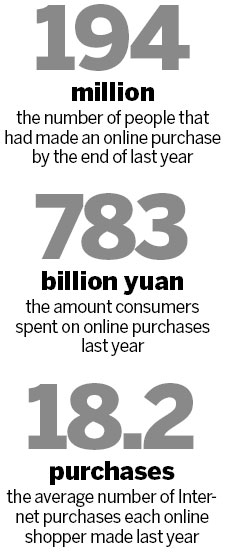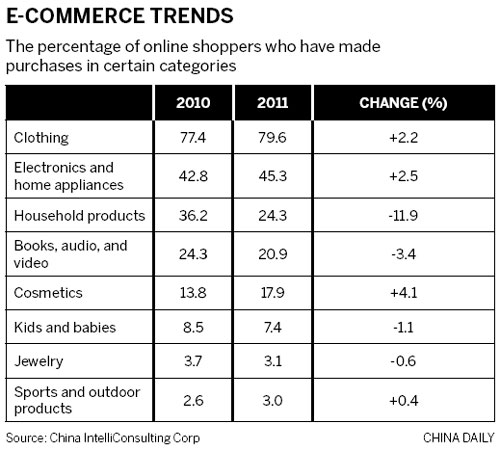
Online purchases account for rising portion of total retail sales in China
When Wang Longxia, 51, saw her colleague's new house furnished with materials that were purchased online - from floor tiles to furniture - she was impressed with his results and decided to take the plunge with e-commerce.
That was two years ago, when online shopping was completely new to her. She made her first online purchase - a book - and was encouraged when everything went smoothly.
Now, she navigates through websites with ease, making purchases such as her mobile phone and a 3,000-yuan ($472) laptop computer.
She is by no means an online shopaholic, who are usually younger netizens between 18 and 30.
However, as an increasing number of Chinese gain Internet access, people are changing the way they shop, whether they are die-hard Web users or simply trying to keep pace with technology.

Out of 513 million Internet users in China, about 194 million people had made an online purchase by the end of last year, according to the China Internet Network Information Center.
Consumers spent 782.6 billion yuan online last year, which accounted for 4.32 percent of total retail sales in the country.
China is expected to overtake the United States to become the largest online shopping market by next year, said Li Jinqi, head of the department of electronic commerce and information at the Ministry of Commerce.
Wang, a company manager in Guangdong province, has witnessed the changes in shopping trends in the past decades.
"At one time, I had to dash to several department stores just to find a piece of furniture with the best combination of price and quality," she said.
"It consumed too much time and the selection was very limited."
About 10 years ago, she started to buy consumer products - mainly cosmetics - through television shopping programs.
The programs, selling a wide range of products from pressure cookers to cars, generated sales of 23.4 billion yuan in 2009, or 0.19 percent of total retail sales that year, according to industry figures.
Shopping in brick and mortar stores continues to be the most common shopping experience in China, but some people have moved their shopping carts from the streets to TVs to computers, just like Wang.
In certain categories, including books, clothing, and consumer electronics, online sales exceed 10 percent of total retail sales in that category, said Lu Bowang, president of China IntelliConsulting Corp, a market research company.
Online sales of books, one of the first type of products sold on the Internet, account for more than 20 percent of total book sales.
Other categories, such as building materials and furniture, are likely to see substantial growth in the next two to three years, he added.
 |
|
The websites of the Chinese e-commerce giant Alibaba Group Holding Ltd and its subsidiaries - the consumer-to-consumer marketplace taobao.com and the payment platform Alipay.com. [Photo/Agencies] |
Last year, each online shopper spent an average of 4,341 yuan, up 28.8 percent from 2010, and made 18.2 online purchases, according to a survey of 3,310 people by China IntelliConsulting.
The rise in average spending contributed more to the sector than the increase in the number of online shoppers, accounting for two-thirds of e-commerce growth last year, the survey found.
Online shoppers in central and western China have been increasing their spending more rapidly than those in eastern China, it said.
While current e-commerce websites are simply another outlet for traditional retail, "made-to-order" shopping experiences that consider the specific needs of each online customer will become the future of e-commerce, according to Zeng Ming, chief strategy officer of the Chinese e-commerce giant Alibaba Group Holding Ltd.
Online retail sales in China will triple to more than $360 billion by 2015, according to a report by The Boston Consulting Group.
 |







